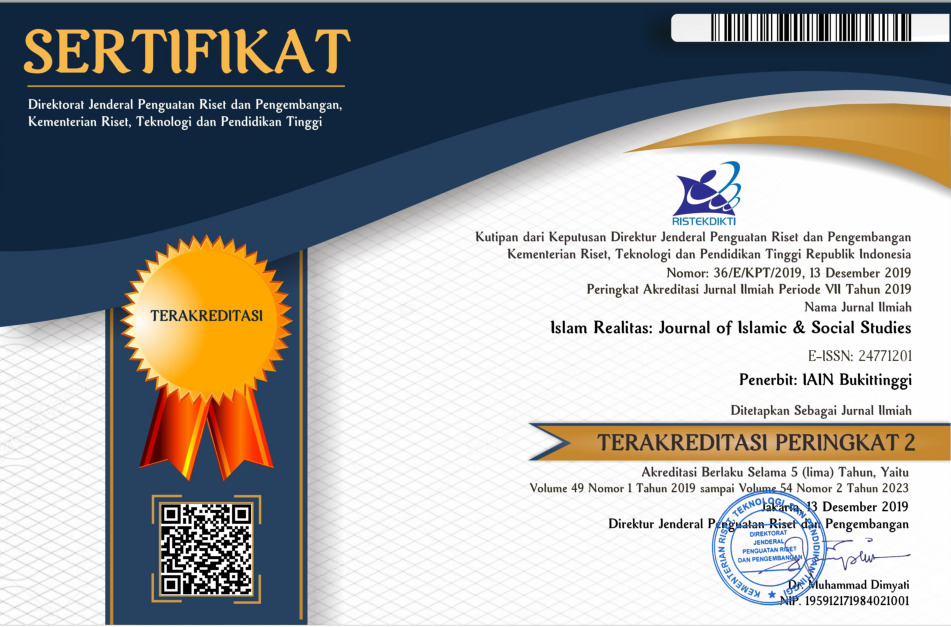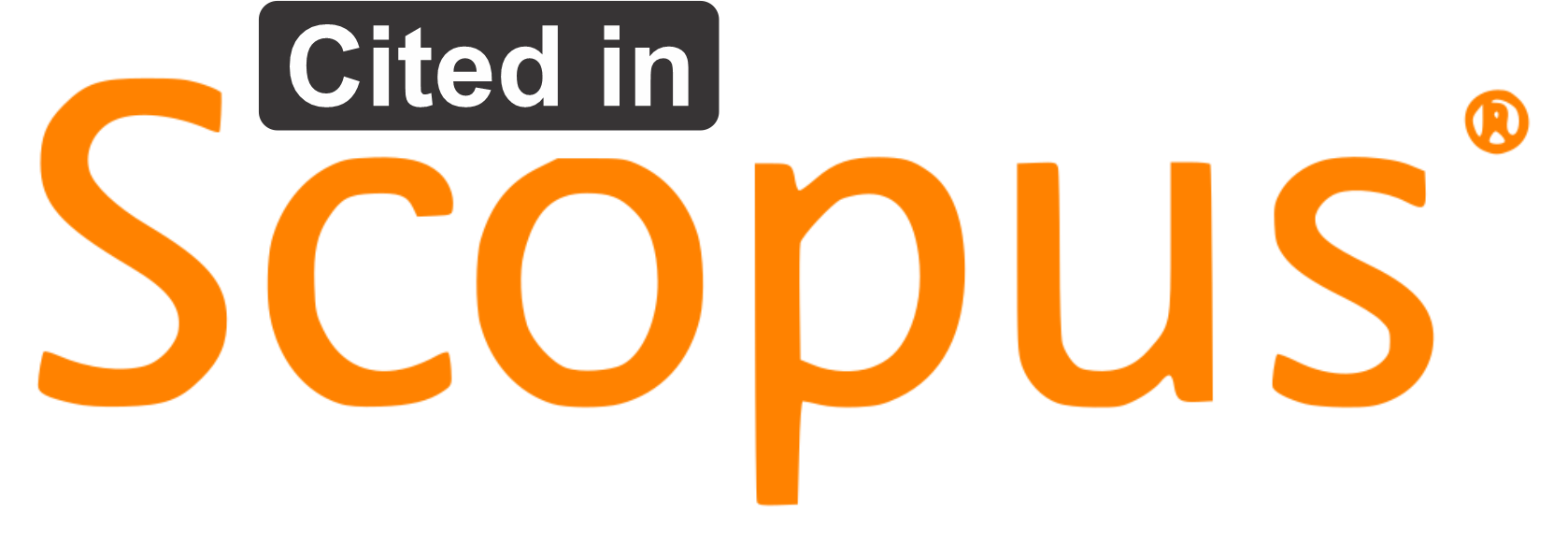The Practice of Multicultural Education at Majelis Taklim in Sitiung Dharmasraya, West Sumatra
Downloads
This article aims to describe the existence of the majelis taklim (Islamic forum) and how this majelis taklim strengthen its role in providing multicultural education for multicultural communities in Sitiung Dharmasraya, West Sumatra. In contrast to several studies which show that the majelis taklim is an agent of spreading intolerant narratives in society, this article tries to present the face of the majelis taklim that is friendly to diversity by strengthening multicultural education. This study uses a participatory action research method. Data were obtained through interviews, focus group discussion, observations, documentation, and actions or improvements through workshops in the July-November 2018 period at majelis taklim in Sitiung Dharmasraya, West Sumatra. The findings of this study indicate that the majelis taklim in Sitiung are attended by people who come from various elements and backgrounds and different mindsets, but the attitude of togetherness is maintained and synergized. In addition, the existing majelis taklim are used as a forum for increasing awareness of community members who are starting to feel the impact of modernization and globalization, and are starting to plunder solidarity and tolerance. The strengthening of multicultural education carried out through participatory action research in this study shows that the taklim assembly can function as a center for peace values, a center for change agents to become better Muslims, a community development center, communication and information center, a cadre center and a social control agent.
Â
Artikel ini bertujuan untuk mendeskripsikan eksistensi majelis taklim dan memperkuat perannya dalam menghadirkan pendidikan multikultural bagi masyarakat multikultural di Sitiung Dharmasraya, Sumatera Barat. Berbeda dengan beberapa studi yang menunjukkan bahwa majelis taklim menjadi agen penyebar narasi intoleran di masyarakat, artikel ini berusaha menghadirkan wajah majelis taklim yang ramah keragaman dengan usaha memperkuat pendidikan multikultural. Studi ini menggunakan metode participatory action research. Data diperoleh melalui wawancara, focus group discussion, observasi, dokumentasi, serta aksi atau penguatan melalui workshop pada periode Juli-November tahun 2018 di majelis taklim yang ada di Sitiung Dharmasraya, Sumatera Barat. Temuan studi ini menunjukkan bahwa majelis taklim-majelis taklim yang ada di Kecamatan Sitiung diikuti oleh masyarakat yang datang dari berbagai unsur dan latar belakang serta pola pikir yang berbeda, namun sikap kebersamaan tetap terjaga dan bersinergi. Selain itu, kelompok majelis taklim yang ada dijadikan sebagai wadah untuk peningkatan kesadaran anggota masyarakat yang mulai merasakan dampak modernisasi dan globalisasi, serta mulai menjarah solidaritas dan toleransi. Penguatan pendidikan multikultural yang yang dilakukan melalui participatory action research dalam studi ini, menunjukkan bahwa majelis taklim dapat berfungsi sebagai pusat nilai perdamaian, pusat agen perubahan untuk menjadi umat Islam yang lebih baik, pusat pengembangan masyarakat, pusat komunikasi dan informasi, pusat kader dan agen kontrol sosial.
Abidin, Zaenal. “Majlis Ta’lim (Islamic Forum) and Harmonizing Inter Faith Communication.†INJECT (Interdisciplinary Journal of Communication) 4, no. 1 (2019): 115.
Anggraini, Retno. “Integrasi Sosial Masyarakat Multietnik Di Nagari Sitiung Kabupaten Dhamasraya.†Jurnal Sosiologi Andalas 5, no. 2 (October 1, 2019): 115–132. http://jsa.fisip.unand.ac.id/index.php/jsa/article/view/21.
Astari, Puji. “Mengembalikan Fungsi Masjid Sebagai Pusat Peradaban Masyarakat.†Jurnal Ilmu Dakwah dan Pengembangan Komunitas 9, no. 1 (2014).
Baharun, Hasan, and Robiatul Awwaliyah. “Pendidikan Multikultural Dalam Menanggulangi Narasi Islamisme Di Indonesia.†Jurnal Pendidikan Agama Islam (Journal of Islamic Education Studies) 5, no. 2 (2017): 224.
Baidhawy, Zakiyuddin. “Muatan Nilai-Nilai Multikultural Dan Anti-Multikultural Dari Mimbar Masjid Di Kota Solo.†Jurnal Analisa 21, no. 2 (2014): 173–187.
———. “The Problem of Multiculturalism: Radicalism Mainstreaming through Religious Preaching in Surakarta.†JOURNAL OF INDONESIAN ISLAM 4, no. 2 (December 1, 2010): 268. http://jiis.uinsby.ac.id/index.php/JIIs/article/view/71.
Banks, James A. “Multicultural Education: Historical Development, Dimensions, and Practice.†Review of Research in Education 19 (1993): 3. http://links.jstor.org/sici?sici=0091-732X%281993%2919%3C3%3AMEHDDA%3E2.0.CO%3B2-N&origin=crossref.
———. “The Construction and Historical Development of Multicultural Education, 1962–2012.†Theory Into Practice 52, no. sup1 (October 20, 2013): 73–82. http://www.tandfonline.com/doi/abs/10.1080/00405841.2013.795444.
Huda, Imamul. “Pemberdayaan Masyarakat Berbasis Multikultural Di Majelis Taklim An Najach Magelang.†INFERENSI: Jurnal Penelitian Sosial Keagamaan 13, no. 2 (2020): 253–278.
Ibrahim, Rustam. “Pendidikan Multikultural: Pengertian, Prinsip, Dan Relevansinya Dengan Tujuan Pendidikan Islam.†Addin: Media Dialektika Ilmu Islam 7, no. 1 (2013): 1–18.
Ikhsan, MT Hartono, and Sandi Fauzi Giwangsa. “The Importance of Multicultural Education in Indonesia.†Journal of Teaching and Learning in Elementary Education (Jtlee) 2, no. 1 (2019): 60.
Kasim, Rizal DJ. “Majelis Taklim Dan Masyarakat Multikultural: Tinjauan Fungsi Dan Bentuk Kegiatan Majelis Taklim Pada Masyarakat Multikultural Di Kota Manado.†Jurnal Syntax Transformation 2, no. 3 (2021): 398–408.
Marzuki, Ahmad, Mohamad Zaidin Mohamad, and Rohaizan Baru. “Role of Majelis Taklim and Adaptation Muslim Minority with Tengger Local Culture.†International Journal of Academic Research in Business and Social Sciences 8, no. 10 (2018).
Nakaya, Ayami. “Overcoming Ethnic Conflict through Multicultural Education: The Case of West Kalimantan, Indonesia.†International Journal of Multicultural Education 20, no. 1 (2018): 118–137.
Nieto, Sonia. “Re-Imagining Multicultural Education: New Visions, New Possibilities.†Multicultural Education Review 9, no. 1 (January 2, 2017): 1–10. https://www.tandfonline.com/doi/full/10.1080/2005615X.2016.1276671.
Setiawati, Nur. “Majelis Taklim Dan Tantangan Pengembangan Dakwah.†Tabligh 13, no. 1 (2012): 81–95.
Taufik, Zulfan. “Berebut Kuasa Rumah Tuhan: Ekspansi Ideologi Radikal Melalui Masjid Di Kota Bekasi.†Islam Realitas: Journal of Islamic & Social Studies 4, no. 1 (December 25, 2018): 21. https://ejournal.iainbukittinggi.ac.id/index.php/Islam_realitas/article/view/506.
———. “From Negative to Positive Peace: Strengthening the Role of Youth in Religious Peacebuilding in Bukittinggi, West Sumatra.†AKADEMIKA: Jurnal Pemikiran Islam; Vol 25 No 2 (2020) (October 4, 2020). https://e-journal.metrouniv.ac.id/index.php/akademika/article/view/2132.
Widiyanarti, Tantry. “Pengajian Al Quran Sebagai Perekat Kebhinnekaan (Kajian Pola Komunikasi Dalam Pengembangan Nilai-Nilai Pancasila Pada Masyarakat Multikultural Melalui Pengajian Al Quran Di Medan, Sumatera Utara).†Nyimak (Journal of Communication) 1, no. 1 (2017): 1–21.
Zainiyati, Husniyatus Salamah. “Curriculum, Islamic Understanding and Radical Islamic Movements in Indonesia.†Journal of Indonesian Islam 10, no. 2 (2016): 285–307.
Interviews
Agusri Yusuf (Religious Leader), Interview, 30 Agustus 2018.
Aswat (Walinagari Siguntur), Interview, 15 Nopember 2018.
Firdaus, (Majelis Taklim Leader), Interview, 24 Oktober 2018.
Hamzan Dt. Mangkuto Rajo (Kepala suku Piliang), Interview, 30 Agustus 2018.
Zulfajri (Community Leader of Pisang Rebus), Interview, 10 July 2018.
Authors who publish with this journal agree to the following terms:
- Authors retain copyright and grant the journal right of first publication with the work simultaneously licensed under a Creative Commons Attribution License that allows others to share the work with an acknowledgment of the work's authorship and initial publication in this journal.
- Authors are able to enter into separate, additional contractual arrangements for the non-exclusive distribution of the journal's published version of the work (e.g., post it to an institutional repository or publish it in a book), with an acknowledgment of its initial publication in this journal.
- Authors are permitted and encouraged to post their work online (e.g., in institutional repositories or on their website) prior to and during the submission process, as it can lead to productive exchanges, as well as earlier and greater citation of published work (See The Effect of Open Access).









